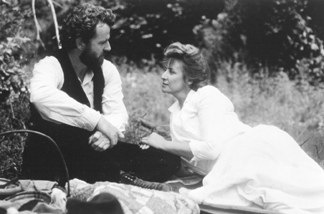Collecting Appalachia
'Songcatcher' Offers Appealing Music and Predictable Plot
By Patrick Reed

Aidan Quinn and Janet McTeer play that mountain music.
With Songcatcher, writer-director Maggie Greenwald uses the setting of early-twentieth century Appalachia and its thriving folk tradition to explore several complex, problematic themes that run throughout American history: economic exploitation, sexual discrimination, and cultural oppression. There's a lot going on in Songcatcher, despite its laid-back narrative flow and naturalistic feel; Greenwald's perspective on Appalachian life is full of good intentions but offers few surprises. Despite compensating elements - the music, for one - Songcatcher too often feels like a lecture rather than a story, one with a lot of rather obvious points to stress and not enough perception.
The film begins in North Carolina, 1907, where musicologist Dr. Lily Penleric (Janet McTeer, Oscar-nominated as the flighty mom in Tumbleweeds [1999]) is packing up to leave her university teaching job because she has again been overlooked for promotion by the male chauvinist faculty. She heads to the West Carolina hills, where her sister Elna (Jane Adams, from Wonder Boys [2000] and Happiness [1998]) teaches at a remote schoolhouse alongside an affectionate older colleague (E. Katherine Kerr). Lily brings along her fieldwork recording equipment - musical notation sheets and a cumbersome Edison cylinder - and is rewarded almost immediately with a deluge of old Scottish and Irish ballads, courtesy of a young schoolgirl named Deladis (Emmy Rossum). The girl's rendition of "Barbara Allen" comes as a delightful shock to Lily, and she soon learns that there are dozens of songs echoing throughout the widely-scattered population, all of them passed down through generations, waiting to be documented and presented to the outside world. With this mother lode of mountain music, Lily can blaze a trail in her profession, and help to eradicate regional prejudice as well. Now, all she has to do is collect the music.
Assisted by Deladis and her insolent boyfriend (Greg Cook), Lily lugs her equipment from house to isolated house, collecting songs in various forms, from a cappella vocal to banjo and dulcimer. She forms a bond with Viney Butler, a stubborn-yet-good-hearted matriarch who has memorized many love and murder ballads (Pat Carroll plays Viney as a slightly rougher version of Jane Darwell's Ma Joad in John Ford's The Grapes of Wrath [1940]). Viney's grandson Tom Bledsoe (Aidan Quinn), a musical prodigy who ventured beyond the hollers to fight in the Spanish-American War and returned to brood over the bigotry he experienced, bluntly tells Lily that he wants no part of her cultural "theft." Others are more receptive, however, and Lily soon has enough transcriptions to send to her erstwhile colleagues at the university. When Lily receives word that she will only be given an "assistant" credit for her hard work, she finally realizes that she remains as much of an outsider in the academic world as she is in her new removed surroundings.
Songcatcher regards Lily as a proto-feminist heroine - similar to the protagonist of Greenwald's previous picture The Ballad of Little Jo (1993) - but also questions the way her fieldwork confines the Appalachian community by emphasizing their "authentic" and "organic" traits. Tom serves as the voice of dissent; even as he and Lily become romantically involved, he warns her of the perils of misrepresentation, believing that at some basic level her music-gathering, couched in the noble guise of "folklore," is not much different than the invasive land-shredding of the timber and coal barons. The eternal issue of Appalachian exploitation hovers around Songcatcher's narrative, but apart from Tom's brief insight the film doesn't go very deep in exploring it. Longtime movie villain David Patrick Kelly portrays a stereotypical coal company operative, and several of the other supporting characters never rise above similar one-note constructs. Also, a subplot involving the community's religious outrage at an illicit lesbian relationship comes across as a plot contrivance, inserted in order to put Lily's project in even more peril.
Overall, then, Songcatcher is a film that sets a liberal agenda and stoically adheres to it, limiting its dramatic possibilities. The music-collecting sequences are the most appealing and least predictable parts of the film, as the actors and a few prominent musicians infuse the age-old songs with feeling. Taj Mahal appears as a roadside banjo picker, all too briefly; Iris DeMent registers more screen time singing "Pretty Saro." The best musical moment occurs at a community barn dance, when, after a fight, several people - including the great Hazel Dickens (who also appeared in John Sayles' Matewan [1987] and the landmark coal-war documentary Harlan County, U.S.A. [1976]) take turns wailing a precursor of "O Death," which is interpreted by Ralph Stanley on the recent Oh Brother, Where Art Thou? soundtrack. (Note to fans of Songcatcher's music: the accompanying CD is one of those "Music From and Inspired By" collections. A lot of the onscreen music is replaced with folk songs performed by contemporary singers.)